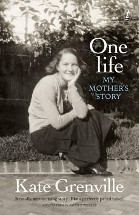One life. My mother's story by Kate Grenville

Text, 2015. ISBN 9781925240962
Highly recommended. Kate Grenville, the author of The Secret
river and Sarah Thornhill amongst other novels,
explains this biography of her mother as an attempt to describe the
life of an individual who was part of a social class that is largely
ignored in historical writing. However, Grenville needs no excuse or
rationale; the story is beautifully told and gives her mother, Nance
Gee nee Russell, 1912-2002, the dignity she deserves. It is also a
very enjoyable read. There is no authorial voiceover or explanatory
commentary, but this is clearly the story of women whose aspirations
were stifled by societal expectations. Nance was born to Dolly and
Albert Russell, an unhappily married couple who made a career from
hotel keeping until the Depression hit in the early 1930s. Nance and
her older brother were boarded out for a number of years, Nance at
first with a very rigid and unloving Catholic spinster and then in a
convent, despite not being Catholic. She was fortunate to have
several years of excellent schooling in Sydney before being forced
back to a country school where few boys and even fewer girls stayed
past leaving age, and standards were low. Nance wanted to be a
teacher but this was emphatically rejected by her mother, and
instead was sent to Sydney to train as a pharmacist. She was
apprenticed to a martinet and struggled to understand the university
lectures. No-one had money, because of the Depression, and Nance,
lonely and poor, at times thought life too hard to be worth living.
There were very few girls studying and the attitude to them was
disparaging. When Nance qualified she was paid less than male
graduates and she missed the bonds of family life. However, she had
met inspiring young women and had learnt that she could have some
control over what happened to her. She ran a pharmacy and had a love
affair with its owner. She could have married any one of several
young men but eventually chose an inspiring young communist lawyer.
When war broke out she was disillusioned by his attempts to evade
service and she realized that secrecy and subversion were essential
parts of his character. She saw too that while despite his evasions
she loved him he admired her rather than loved her. They had two
children and Nance daringly planned to run a pharmacy again. The
business was a success but in the early fifties there was no child
care available; her mother failed her despite offering support and
her husband could not imagine doing more than he did about the
house. Nance sold the pharmacy, built a house with the money and had
another child, Kate. Nance tried again later to have a business but
even in the late fifties child care was not available.
Love of family was a dominant theme of her life, despite a difficult
relationship with her mother, and her children were a constant
delight to her. Another theme is the necessity to make the most of
one's talents. She believed that the unexamined life is not worth
living and this is a theme of her later life in particular. The
writing is engaging and the character of Nance believably
established. The social history of the times is accurately
reflected. This book is highly recommended.
Jenny Hamilton